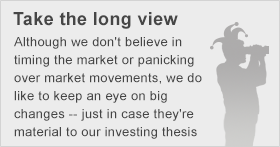
The stock market largely brushed off a reported 1% decline in GDP during the first quarter, and near the end of trading the Dow Jones Industrial Average (^DJI +0.48%) was up 0.43%. As fellow Fool Alex Planes pointed out, the contraction was driven by a decline in private investment, namely homebuilding and capital equipment.
Investment can swing quarter to quarter, and it's likely that we'll see a swing the other way when the second quarter's numbers are released, so Wall Street isn't reacting negatively to what seems like a bad headline.
We're seeing big gains today in the solar industry, which is once again revolutionizing how we invest in energy.

Wall Street loves the yieldco
SunEdison (SUNE +0.00%) said today that its yieldco subsidiary, TerraForm Power, had filed an S-1 for its planned IPO. The entity will own and operate solar energy generating assets built by SunEdison and other project builders.
This isn't a new concept, NRG Energy launched NRG Yield (NYLD 1.05%) last year, and companies such as SunPower (SPWR +0.00%) also see yieldcos as a potential option in the future. Why does the market love this move so much?

Residential solar installations like this one could someday be owned by a yieldco. Image courtesy of SunPower.
Yieldcos give investors the ability to invest in solar projects without taking the risk of owning a panel manufacturer or installer like SolarCity (SCTY +0.00%). From the company side, the more yieldcos on the market, the more buyers there are for their solar assets.
SunPower says it will determine the fate of projects like the 100-megawatt Henrietta and the 135 MW Quinto power plants in California once the projects are built. In other words, they may be sold to yieldcos like NRG Yield or TerraForm Power if the price is right.
We may also see some of SolarCity's assets eventually end up in a yieldco to get exposure to the residential market. This would be one way for SolarCity to monetize assets, something it will need to do to keep up its torrid growth pace.
The big picture
One of the challenges the solar industry has faced in the last decade is finding financing for projects. Solar was viewed as high risk and investors commanded high returns just to buy a project.
But that risk profile has improved, and as new financing options such as equity financing, securitization, and yieldcos grow, the industry will grow along with them That's why a seemingly small announcement like a yieldco from SunEdison can cause companies like SunPower to SolarCity, which seemingly have little to do with SunEdison, to pop. More financing is good for solar and it's good for everyone.






